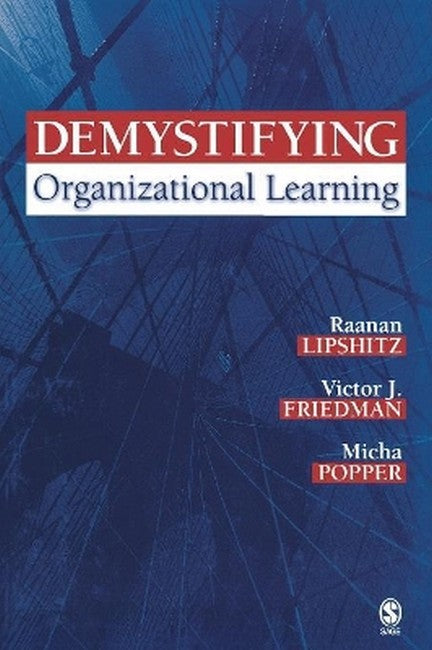Raanan Lipshitz is Associate Professor of Psychology in the Department of Psychology, University of Haifa. He is Senior Editor, Organization Studies (SAGE). Professor Lipshitz specializes in organizational psychology, organizational learning, and decision making. He has written numerous articles for publications such as Journal of Applied Behavioral Sciences, Journal of Management Studies, Organizational Behavior & Human Decision Processes, Training & Development Journal, Leadership & Organization Development Journal, Journal of Vocational Behavior, Journal for the Theory of Social Behavior, Organization Studies, Journal of Creative Behavior, Journal of Management Learning, The Learning Organization, and Behaviorial and Brain Sciences. He is co-editor of Brehmer, B., Lipshitz, R., & Montgomery, H. (Eds.), (forthcoming) How Do Professionals Make Decisions? Mahaw, NJ: Lawrence Erlbaum. Victor Friedman is an Associate Professor with a joint appointment to the Behavioral Sciences and the Sociology and Anthropology departments at the Emek Yezreel (Jezreel Valley) College, Israel. His work focuses on an "action science" approach to integrating research with practice in areas characterized by uncertainty, uniqueness, and conflict. He has worked with educational, social service, government, and business organizations and has published papers dealing with organizational learning, program evaluation, social entrepreneurship, and social inclusion. Professor Friedman is a founder and the director of the Action Research Center, an initiative to develop a more responsive mutual relationship between academia and the local community. Dr. Friedman received his Ed.D. from Harvard University in Counseling, Consulting, and Community Psychology, his M.A. from Columbia University, and his B.A. from Brandeis University. He is a senior associate of the Action Evaluation Research Institute and has participated in the "Project for Productive Reflection and Learning at Work", sponsored by the Swedish National Institute for Working Life, and the international "Kolleg" in Organizational Learning, sponsored by the Daimler-Benz Foundation. He has been a visiting scholar-faculty at the Organizational Learning Center at the Massachusetts Institute of Technology (MIT), the Berlin Social Science Institute (WZB), the Leipzig Graduate School of Management (HHL), and the Theseus Institute in France. Micha Popper is Associate Professor and the head of the Organizational Psychology Program in the Department of Psychology at the University of Haifa , Israel, is the former commanding officer of the School for Leadership Development of the Israel Defense Forces .He is the founder and director of the Center for Outstanding Leadership in Zikhron Yaakov Israel ; A scholar of the US Army Research Institute( ARI ) and has been a visiting professor at Simon Fraser University in Vancouver Canada His research and consulting concern organizational learning and the dynamics of leader- followers relationship and developmental aspects of leaders . He has a Phd from Tel -Aviv University (Organizational Behavior), MA from Tel-Aviv University and BA from the Hebrew University in Jerusalem . Author and co-author of five books on leadership and numerous articles in journals including The leadership Quarterly , Political Psychology , Academy of Management Journal , Military Psychology , Management Learning and Journal of Applied Behavioral Science.
Request Academic Copy
Please copy the ISBN for submitting review copy form
Description
Preface Part 1: Introduction Chapter 1: Demystifying Organizational Learning The Mystification of Organizational Learning Demystification The Facets of Organizational Learning Applying the Multi-Facet Model How to Read This Book To Sum Up Part 2: The Multi-Facet Model Chapter 2: Organizational Learning Mechanisms Types of Organizational Learning Mechanisms Off-Line/Internal OLMs Online/Internal OLMs Off-Line/External OLMs Online/External OLMs Mechanisms, Technologies, and Choosing the "Right" OLM Chapter 3: The Cultural Facet: The Key to Productive Learning Cultural Islands of Learning The Norms of a Learning Culture Demystifying Culture and Organizational Learning Chapter4: The Psychological Basis of Productive Learning Psychological Threat and Psychological Safety Organizational Learning as a Source of Psychological Threat Defensiveness and Defensive Routines Psychological Safety and Trust Creating Psychological Safety Commitment to the Organization Chapter 5: The Context of Organizational Learning Environmental Uncertainty Task Uncertainty Task Structure Proximity to the Organization's Core Mission Organizational Structure Chapter 6: Organizational Learning and Managerial Channels of Influence Instituting OLMs Tolerance for Failure Commitment to the Workforce Manager's Behavioral Channels of Influence Chapter 7: The Dissemination of Knowledge The Problem of Dissemination The Source of Knowledge The Recipient of Knowledge The Relationship Between Source and Recipient Understanding Knowledge Dissemination Mechanisms Attributes of the Organizational Context Demystifying Dissemination Part 3: Applying the Model Chap 8: Inside an OLM: Postflight Reviews in the Israeli Air Force Learning Functions Social and Control Functions Psychological Functions Psychological Safety and Learning Culture in a High-Threat Environment What Can Managers Learn From Postflight Reviews? Chapter 9: Is Training Organizational Learning? Computer Chips International Johnsonville Foods Motorola University Dell Learning Bell Labs Discussion and Lessons Learned Chapter 10: High-Quality Organizational Learning: Why Do Some After-Action Reviews Work and Others Don't? Low-Quality After-Action Review High-Quality After-Action Review Chapter 11: Demystiying the Learning Organization I: The Case of Hewlett-Packard HP' Work Innovation Network (WIN) The HPC Knowledge Management Initiative Why Did WIN Die and the KM Inititative Live? Demystifying the Learning Organization Chapter 12: Demystifying the Learning Organization II: The Case of Chaparral Steel Organizational Learning Mechanisms at Chaparral Productive Learning at Chaparral Steel The Contextual Facet Conclusion Chapter 13: Putting the Multi-Facet Model Into Practice Background Designing the Organizational Learning Process: An Action Science Approach Ending the Formal Organizational Learning Intervention Epilogue Demystifying the Organizational Learning Process Chapter 14: Before We Go... References Index About the Author

